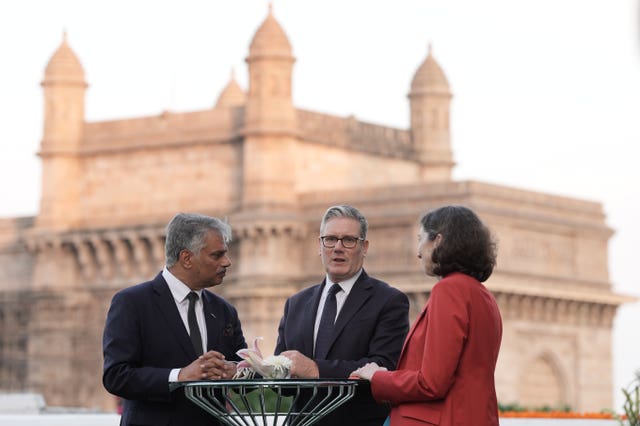The Prime Minister is on a trade mission to Mumbai.
Sir Keir Starmer has met the architect of India’s national identification system, as he seeks to expand his plans for a digital ID.
The Prime Minister announced in September that the new digital ID system would be introduced in 2029, and would be mandatory for people working in the UK as part of a bid to tackle illegal migration.
But during his trade mission to Mumbai, Sir Keir has suggested he wants to expand beyond the current plans to a voluntary national ID which could help manage public services such as benefits and bill payments.
Under the original mandatory scheme, photo IDs would be stored on smartphones in a similar way to digital bank cards and would contain information on the holder’s name, residency status, date of birth and nationality.
The plans have faced a wave of opposition since Sir Keir announced them, and support for digital ID has plummeted in the polls.
As he led the India trade mission, the Prime Minister met Nandan Nilekani, a founder of the Indian technology company Infosys, to discuss India’s voluntary digital ID.
Mr Nilekani left tech giant Infosys in 2006 to help set up Aadhaar, India’s digital identification authority.
The biometric system is the largest of its kind in the world, and covers all but a fraction of India’s population.
While it is technically a voluntary system, some have raised concerns that those without an Aadhaar number have been left locked out of access to benefits, while others have highlighted security and privacy concerns within the system.
Ahead of the meeting, the Prime Minister told reporters he believed the Government’s work on mandatory ID was “really important” for tackling migration.
But he added: “I think there is a case to be made about the benefits for voluntary ID into other areas, and obviously we need to make that case.
“I think it’s a really important discussion for us to have. So on the one hand, it’s mandatory for work, but I actually think it would be a good passport.
“You know, I don’t know how many times the rest of you have had to look in the bottom drawer for three bills when you want to get your kids into school or apply for this or apply for that. Drives me to frustration.”

The Prime Minister’s official spokesman told reporters the half-hour meeting had given Sir Keir a chance to hear about how the Indian system had been “useful” for managing services such as welfare.
The private sector has also managed to “dock” into India’s system, the spokesman said, but signalled a UK system would be run by the public sector.
Britain’s digital ID would not necessarily copy India’s biometric data usage, he added, as it was not “directly applicable nor comparable” with the UK.
The spokesman also defended the Government’s plans amid the growing public backlash, after being asked about the 2.8 million people who have now signed a petition against the measures.
“When you set out radical, ambitious public service reform it is natural for people to have thoughts and we obviously acknowledge them,” he said.

